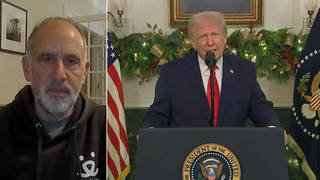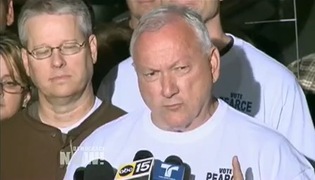
Guests
- Jeff Biggersjournalist and author of several books, most recently, State Out of the Union: Arizona and the Final Showdown Over the American Dream.
Last week a federal judge lifted an injunction against a key component of Arizona’s controversial anti-immigrant law, S.B. 1070, requiring police to check the immigration status of people they stop before releasing them. On Saturday, hundreds of protesters marched in Phoenix to protest the law, which they say enables racial profiling. As the “show me your papers” law goes into effect, we’re joined by journalist Jeff Biggers, author of the new book, “State Out of the Union: Arizona and the Final Showdown Over the American Dream.” [includes rush transcript]
Transcript
AMY GOODMAN: We’re on our 100-city tour, back in New York City. On Wednesday, I’ll be speaking at the University of Connecticut in Storrs.
We begin today’s show looking at Arizona. Last week, a federal judge lifted an injunction against a key component of Arizona’s controversial anti-immigrant law, S.B. 1070. The “show me your papers” measure requires police to check the immigration status of people they stop before releasing them. On Saturday, hundreds of protesters marched in Phoenix to protest the law, which they say enables racial profiling. The protest stopped at a Maricopa County jail run by Sheriff Joe Arpaio, who’s up for re-election in November. Arpaio has been a vocal supporter of S.B. 1070.
SHERIFF JOE ARPAIO: I think this is a good section that’s been upheld. I would have liked to see where we would have the authority to arrest illegal aliens just by being here illegally and book them into our jails, but that’s not going to happen. But I think this sends a message that we will be involved in enforcing the illegal alien laws and our police officers will be able to at least try to determine if they’re in this country illegally.
AMY GOODMAN: For more on the latest from Arizona, we turn now to author and journalist Jeff Biggers. His new book is called State Out of the Union: Arizona and the Final Showdown Over the American Dream.
Welcome to Democracy Now!, Jeff.
JEFF BIGGERS: Glad to be back.
AMY GOODMAN: Let’s start here with 1070. Talk about what the “show me your papers” actually means now that it’s gone into effect.
JEFF BIGGERS: Right. You know, I think, in effect, Amy, we’re talking about one of the—a new chapter and one of the darkest chapters in civil rights violations that we’re going to be facing in the future, because this goes beyond just looking at immigration policy. This now affects all Americans who are reasonably suspicious. And, of course, I think many think tanks and many investigations have looked at—this is not only going to open up a state of confusion, we’re talking about all levels of local law enforcements who have to make this call as, you know, who is a person who’s reasonably suspicious to be a so-called undocumented alien. I think we’re really looking at potentially some of the worst racial profiling in American history.
AMY GOODMAN: And show—talk about what this aspect of the law means that’s gone into effect.
JEFF BIGGERS: Right. Well, I think, in many respects, it’s about the Arizonafication of America. It’s beyond just a state immigration policy; it’s a state of mind that we have in Arizona that says not only are we denying the contribution of immigrants, not only are we having a dishonest reckoning with the facts, because, Amy, this year was the lowest apprehension of undocumented residents in Arizona in decades. It’s the lowest crime rates in the borderlands in decades. And so, this is more of a classic example of a shock doctrine where they’ve manufactured this immigration crisis that doesn’t exist in order to ram through their radical right-wing agenda. But I think, most importantly, it has created this state of mind that we have now sanctioned law enforcement officials to go through with racial profiling and actually apprehend and detain people just because they may be reasonably suspicious.
AMY GOODMAN: Your title of your book is State Out of the Union: Arizona and the Final Showdown Over the American Dream.
JEFF BIGGERS: You know—
AMY GOODMAN: Why “out”?
JEFF BIGGERS: Because, once again, we are looking at a fringe movement that somehow managed to gain control of power. When the former governor of Arizona, Janet Napolitano, went off to Washington to become head of Homeland Security in 2009, Jan Brewer, our governor, took power. Jan Brewer was someone who was navigating the politics and really was not part of this anti-immigrant fervor. There was this fringe movement, led by this state senator named Russell Pearce, part of this 10th Amendment movement who believe they’re not citizens of the United States but citizens the sovereign states of the United States, that really believes to the core of states’ rights, going all the way back to folks like in the 1950s. And it’s that small fringe that managed to take power and ram through this very anti-immigrant, extremist agenda that went beyond immigration policy. It went to all levels of government, be in healthcare, in guns, in education and, of course, down to the fact of banning Mexican-American studies.
AMY GOODMAN: I want to turn to Jan Brewer. In June, the Supreme Court issued its long-awaited ruling S.B. 1070, which—striking down three of the law’s four provisions that subject undocumented immigrants to criminal penalties for seeking work or failing to carry immigration papers at all times. In each case, the majority said those powers rest with the federal government, not with Arizona. However, in a unanimous decision, the justices upheld the law’s controversial Section 2B, which requires police to check the immigration status of people they stop before releasing them. Arizona’s Republican Governor Jan Brewer hailed the decision to uphold what she called the “heart of the law.”
GOV. JAN BREWER: So today is a day when the key components of our efforts to protect the citizens of Arizona, to take up the fight against illegal immigration in a balanced and constitutional way, has unanimously been vindicated by the highest court in the land.
AMY GOODMAN: That was Governor Brewer. So continue. What happened? Why did she shift?
JEFF BIGGERS: She shifted because in the early spring 2010 Brewer was running for election, finally, as governor. She was behind in the polls. She was losing to her Republican challenger. But a poll also came out and showed that most Americans were worried about the war that was brewing in Mexico. And this is part of a longstanding tradition. This is where, to understand the Arizonafication of America, you have to understand the history of Arizona. Politicians for over a century have used the “brown scare,” as we say in Arizona, have used the fear mongering of the border of immigrants of Mexico, for political gains. And that is exactly what Jan Brewer did. When we had a tragic murder of a single rancher in Cochise County on the border, of course, in the spring 2010, soaked in his memory they were able to ram through S.B. 1070, which Russell Pearce had been trying to pass for years. And then we began this whole shift. The good news, though, is, Arizona didn’t just sit tight, they fought back.
AMY GOODMAN: And explain what that fightback was and what happened to Russell Pearce.
JEFF BIGGERS: Right. You know, Amy, I’m really here as a cultural historian, not so much as a journalist. I found myself, you know, on the shoulders of people like Howard Zinn and Studs Terkel, of trying to find the other Arizona, the voices that were being left out of the story. And what I found is that for the past hundred years Arizonans actually had been in the forefront of these progressive movements to challenge these kind of extremist spasms every 20 years. And in Arizona, in particular, they didn’t just sit tight.
The first thing they did, within weeks of that bill pass, a young organizer by the name of Randy Parraz in Phoenix began this incredible bipartisan movement in the tradition of another incredible movement in Arizona, the “¡Sí, se puede!” movement of César Chávez, which completely changed Arizona in the 1970s. Within weeks, that movement snowballed. And Russell Pearce, who at one point was seemingly invincible, the tea party president of America, the man who was changing and leading the parade on our immigration policy nationwide, was brought down in the historic recall election. To me, it was probably one of the most important news stories overlooked by the mainstream media, because it showed that Arizona Democrats finally were no longer demoralized, because of organizers like Randy Parraz, but more importantly, that there was this new generations of young Latinos willing now to work with these new baby boomers who are retiring in Arizona and come again, come together and take on extremism and win.
AMY GOODMAN: Jeff Biggers, Sheriff Arpaio is up for re-election. Could he lose?
JEFF BIGGERS: I think he can. In fact, Randy Parraz now is leading the movement to take down Arpaio, as well. I think they realize that these characters do not represent Arizona. And I think this is where it really affects the rest of us in the country. It’s very easy in the media for us to dismiss Arizona as an aberration, you know, this parade, this meth lab of democracy, you know, this parade of neo-Nazis and tea party yahoos, and it can only happen in Arizona, and what’s the matter with Arizona? But the truth is, there’s this other Arizona that’s even more important, this progressive Arizona, that I think is also having an incredible impact on our country.
Within the undocumented community, in the community itself in Phoenix, for example, there’s a wonderful human rights group called Puente. And I’ll never forget Carlos Garcia telling me, just as 1070 went into effect, “Hey, Jeff, we’re going to take this hatred, and we’re going to turn it into a human rights campaign. We’re going to have a new generation that is really going to take this on and bring back Arizona like it should be, and that is an Arizona that really reflects the civil rights, it reflects the history and the cultural legacy of our nation.”
AMY GOODMAN: Talk about what came before. Talk about who César Chávez was and his significance in Arizona.
JEFF BIGGERS: Sure. And we can even go back further. You know, last week we celebrated Occupied Wall Street. But in 1916, the progressive labor governor of Arizona—Arizona came in as a labor state—warned the country that the 99 percent has to fight against the 1 percent, that the battle is between corporate and money influence in politics. This was Governor Hunt in 1916 already launching a 99 percent community. And that community, though, was on the backbone of Mexican immigrant labor in the copper fields. Hunt betrayed them, and eventually we had massive deportations, you know, and once again, we had fightbacks, and fightbacks particularly in the labor fields.
Here we are in 1972, and once again Arizona is getting the national headlines for a punitive law against migrant workers. César Chávez, who’s from Arizona, came back, and everyone said, “No, we can’t do anything, César. It’s impossible. It’s Arizona.” And he — “no se puede, no se puede.” And he flipped it on its head and said, “Yeah, no, sí, se puede. We can do this.” They began this incredible movement to stop this bill. They’ve got it into legislation in courts. But more importantly, they registered 150,000 new voters, and two years later Raúl Castro was elected as the first and only Latino governor.
And I think that is what we’re looking at right now. We’re looking at in Arizona a historic demographic shift that is happening across the country. When you have 80 percent of the elderly who are Anglos or non-Latinos and 60 percent of the youth who are Latinos, what we’re looking at—and this is what the right wing fears, and this is what the Republican Party complete epitomized at their convention—we’re looking at a historic demographic shift that César Chávez prophesized, that one day the political power would be in the hands of the people.
AMY GOODMAN: And, of course, César Chávez being the founder of the whole migrant worker farm workers movement.
JEFF BIGGERS: Right.
AMY GOODMAN: Mitt Romney, you mentioned. I want to talk about this notorious video of Mitt Romney telling a crowd of wealthy donors in Florida he doesn’t worry about the 47 percent of Americans who are, quote, “dependent” on government and see themselves as, quote, “victims.” In comments that have received less attention, Romney is also heard on the original tape joking to his audience that he would have a better chance this election had he been born a Latino.
MITT ROMNEY: My heritage, my dad, as you probably know, was the governor of Michigan and was the head of a car company, but he was born in Mexico. And had he been born of Mexican parents, I’d have a better shot at winning this. But he was unfortunately born to Americans living in Mexico. And he lived there for a number of years. And, I mean, I say that jokingly, but it would be helpful to be Latino.
AMY GOODMAN: The significance of this secret tape that was made of Mitt Romney speaking to these wealthy donors in Florida, Jeff Biggers?
JEFF BIGGERS: You know, once again, here’s the true Romney coming out, a man who is open—openly, he was the first presidential candidate in the Republican Party to embrace 1070, the attrition through enforcement policy. His informal adviser was Kris Kobach, of course, the secretary of state from Kansas, who actually shaped the bill with Russell Pearce in Arizona. Romney has been lockstep with Arizona every step of the way from the beginning. At the same time, they do realize that in 15 states of the swing states you have the vote hinging on about 3 percent in these same states where you’re going to have an increase of 6 to 8 percent of Latino voters. And so they know the Latino voter is going to be the most important vote in this election, and they want to try to coddle it sometime, but at the same time they have completely rejected and dismissed the Latinos and their needs and their rights.
AMY GOODMAN: And, of course, you have Mitt Romney pushing self-deportation.
JEFF BIGGERS: Right, self-deportation. And the irony, of course, is that Romney likes to invoke his family history. And so, as a historian, let’s look at his family history. In a nutshell, Romney’s family did not simply go to Mexico as polygamists, as Mormons. They fled the country on the lam in a perjury charge. They were complete outlaws. And he has completely misrepresented that in his memoir.
AMY GOODMAN: Well, explain.
JEFF BIGGERS: Well, his great-grandfather—in fact, there were a number of Mormon leaders, like the Udall family and the Flake family, who actually had to go to prison for polygamy charges. But at the same time, there was encroachment in land deals, and the Romney family was being persecuted for perjury over a land deal. They went—he revoked—he gave up his bond. He went on the lam. A community was left in the lurch, according to the historical documents, the diaries of the Udalls. And they actually ran off to Arizona as outlaws. And, of course, a few years later, they come creeping back to America as refugees when the Mexican Revolution—
AMY GOODMAN: When they went to Mexico.
JEFF BIGGERS: Mexico, right. And then, once again, they come creeping back as refugees looking for sanctuary when the Mexican Revolution comes by. There’s all sorts of historical contradictions with Romney’s whole relationship with Arizona.
AMY GOODMAN: And President Obama’s relationship with Arizona and with the whole issue of immigration?
JEFF BIGGERS: Right. You know, I think this is something where we have to have a reckoning with the Democratic Party, who actually are taking for granted that the Latinos and the young Latinos are going to be coming with them. And they have made overtures, like this deferred action for DREAMers. But the truth is, President Obama has deported more people than President Bush: 1.1 million Americans will be—have deported in these past four years. And I think this is part of the same punitive strain, the Secure Communities, that Obama is pushing that once again does not reflect what the majority of Americans want.
AMY GOODMAN: I wanted to turn, now that you’ve mentioned the undocumented immigrants and the youth—at the Democratic convention, a busload of more than 40 undocumented immigrants and their supporters known as the UndocuBus arrived in Charlotte, North Carolina, during the DNC. They traveled more than 2,000 miles through 11 states to deliver a message to President Obama. This is bus rider Gabriela Alcazar.
GABRIELA ALCAZAR: Our message to him is to stop the criminalization of our people. He came in as a president that was not only going to fight for immigration reform, but that was with our people. And it turns out he’s deported way more people than even Bush in his whole entire term. So, he has the power. We saw, with the deferred action for DREAMers, he has the power to make changes, and we’re here to demand that he do that. We’re not here saying that we’re not going to vote for him or that we’re going to vote for Mitt Romney. The Republicans have already chosen a side. We know where they stand. And we want the Democrats to do—to pick a side. What side of history are they going to be on?
AMY GOODMAN: Gabriela Alcazar, this UndocuBus, on the day of the DNC opening, when it was gaveled open. A number of people marched out of the bus, very vigorously shouting, “No papers, no fear!” And they unfurled a banner in the pouring rain, as the police were pouring in, with a butterfly. And I asked one of the women who was about to be arrested, “Why a butterfly?” And she said, “Because butterflies know no borders. Butterflies are free.” Ten people that day got arrested who had come in from Phoenix. And as this young woman talks about history, I wanted to end with how you fit in the whole attack on ethnic studies—ground zero, Arizona—with this whole fightback movement.
JEFF BIGGERS: Right. I mean, I think Gabriela really hit it: which side of history are you going to be on? And I think that’s the battle I try to put in my book. And that ultimately is the battle the kids are having in Tucson, not only the students, but the teachers and the community at large. You have a district that’s 65 percent Latino. Public education in Tucson was founded by a Mexican immigrant, Estevan Ochoa. And yet you now have, once again, this waves of interloper, carpetbaggers, someone like Attorney General Tom Horne, who’s a Canadian immigrant, who got his citizenship reportedly in 1954, the same year we had Operation Wetback and we deported hundreds of thousands of Mexicans who had served during World War II. It was about history. It was about the right to your history and your legacy in that cultural context, once again, that’s being left out of the question.
For people like these extremists, they see the history of Arizona ultimately as a controversy to them, as something that is obstructing the reality of what Arizona has been, and therefore, the only thing they can do is outlaw history. They can try to keep kids away from their roots and their legacy, to somehow kind of constantly make them strangers in their own country. And I think that’s what we have to do not only with people like the UndocuBus, people who are residents in Phoenix for years, people like Leticia and Gabriela, who went there and said, “Hey, you know, we are part of the Phoenix community. We’re raising our kids here. We have been here for years. We just need papers.” And I think it’s the same thing with the Mexican-American studies program, of kids who have been in that town for centuries saying, “This is our Arizona. It’s a truer reflection. And the rest of the nation has to decide which side of history they are going to be on: —
AMY GOODMAN: Jeff Biggers—
JEFF BIGGERS: —that other history or the Arizonafication?”
AMY GOODMAN: Jeff Biggers, I want to thank you for being with us. His book is State Out of the Union: Arizona and the Final Showdown Over the American Dream. Nice to have you in studio, as you head back to Arizona.
This is Democracy Now!, democracynow.org, The War and Peace Report. When we come back, Pussy Riot wins a major peace prize, the LennonOno prize awarded by Yoko Ono here in New York. Stay with us.













Media Options